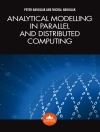Big data technologies are used to achieve any type of analytics in a fast and predictable way, thus enabling better human and machine level decision making. Principles of distributed computing are the keys to big data technologies and analytics. The mechanisms related to data storage, data access, data transfer, visualization and predictive modeling using distributed processing in multiple low cost machines are the key considerations that make big data analytics possible within stipulated cost and time practical for consumption by human and machines. However, the current literature available in big data analytics needs a holistic perspective to highlight the relation between big data analytics and distributed processing for ease of understanding and practitioner use.
This book fills the literature gap by addressing key aspects of distributed processing in big data analytics. The chapters tackle the essential concepts and patterns of distributed computing widely used in big data analytics. This book discusses also covers the main technologies which support distributed processing. Finally, this book provides insight into applications of big data analytics, highlighting how principles of distributed computing are used in those situations.
Practitioners and researchers alike will find this book a valuable tool for their work, helping them to select the appropriate technologies, while understanding the inherent strengths and drawbacks of those technologies.
Table of Content
On the role of Distributed Computing in Big Data Analytics.- Fundamental Concepts of Distributed Computing used in Big Data Analytics.- Distributed Computing Patterns useful in Big Data Analytics.- Distributed Computing Technologies in Big Data Analytics.- Security Issues & Challenges in Big Data Analytics in Distributed Environment.- Application of Big Data Analytics Application in Climate Science.- Applying Distributed Computing in Cognitive Computing.- Distributed Computing in Social Media Analytics.- Utilizing Big Data Analytics for Automatic Building of Language-agnostic Semantic Knowledge Bases.












